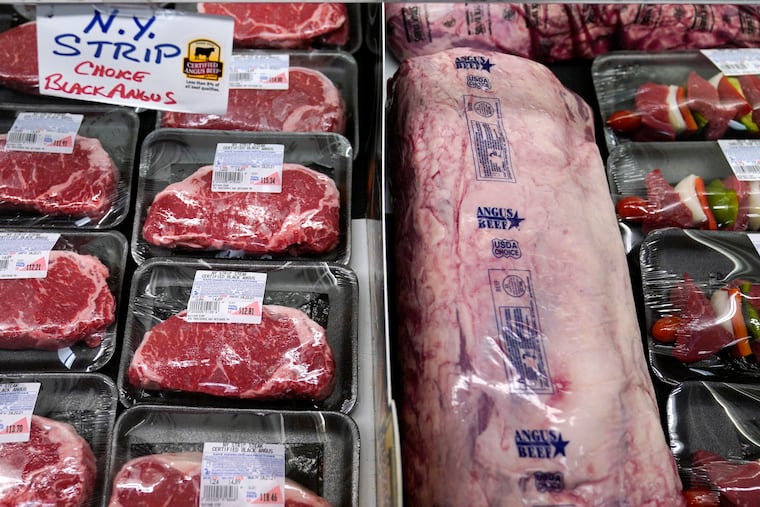U.S. businesses get ready for long inflation
The longer that high inflation persists, the more pressure it will put on the Federal Reserve to tighten monetary policy more than it currently plans -- potentially raising the risk of a recession.

As U.S. businesses and consumers weather the highest inflation in four decades, some firms are already betting those cost increases will be around for longer than many economists are predicting.
At agricultural-equipment parts maker HCC, president Brian Nelson is planning for two to three years of higher costs. This year, the Mendota, Ill.-based supplier to manufacturers including Deere & Co. is anticipating a double-digit percent increase in its wage bill.
It’s still new territory for businesses including HCC that for decades have operated in a U.S. economy where core inflation rates rarely breached the Federal Reserve’s 2% target. But with price gains running at more than double that pace, and no sign of having peaked — months after policy makers anticipated the wave would subside — the dynamic is starting to change behavior.
For Nelson, higher inflation means putting off retirement. HCC’s board asked the 70-year-old to stay on, eager to have someone with experience with past price-surge episodes in charge. He’s also started using HCC’s experiences in Brazil — a country familiar with runaway inflation — to train U.S. sales staff not used to having to raise prices for customers.
"All the costs are going up. All the costs are going crazy," he says.
The longer that high inflation persists, the more pressure it will put on the Federal Reserve to tighten monetary policy more than it currently plans — potentially raising the risk of a recession. For President Joe Biden and Democratic lawmakers, the danger is political blowback not only in November’s midterm ballots but possibly even the 2024 general election.
Economists are increasingly warning that, in the same way that low inflation became embedded before COVID-19 struck, the risk now is that the faster pace of price gains becomes sticky.
“Inflation is inertial,” said Diane Swonk, chief economist for consultancy Grant Thornton. “We’ve had periods of long, low inflation because low inflation begets low inflation. And higher inflation begets higher inflation.”
Part of that dynamic can be seen in goods-price inflation spreading to certain services.
Anna Wong, chief U.S. economist at Bloomberg Economics, points out that the increase in car prices that’s been a big driver of inflation in the last year has in turn fueled an increase in the cost of vehicle insurance. The same dynamic goes for home and health insurance.
"When you see things like that, that's how a transitory shock can lead to more persistent shocks," she says.
Wages are a key category where increases are producing knock-on effects.
Labor shortages spurred Indiana-based Batesville Tool & Die to boost entry-level hourly wages last year to $15 from $10 — a move that then triggered broader increases through the workforce, sending the overall bill up 20% to 25%, according to Jody Fledderman, the company’s CEO.
And it's still going up. With positions remaining open, starting hourly pay is now closer to $17.50, and Fledderman frets the 3% wage-bill hike penciled in for 2022 may already look too low.
“We’re going to be outpacing inflation just to stay competitive,” Fledderman said. “I don’t see that going away anytime soon.”
There’s a real possibility that unless the U.S. tumbles into a recession — killing off inflation — consumer-price gains could sit well above the Fed’s 2% comfort zone even into 2024, according to Jason Furman, who led the Council of Economic Advisers in the Obama administration and now teaches at Harvard University.
"It is definitely possible that, for the first time in decades, inflation is an issue in a presidential campaign in 2024," says Furman. He anticipates consumer-price gains of 4% to 4.5% at the end of this year, down from 7.5% in January.
An Atlanta Fed survey released this month found companies’ expectations for inflation increased substantially in February, hitting 3.6%. About 40% of businesses surveyed expected significant upward pressure on prices from labor and other costs.
For some companies, persistently high inflation has its benefits.
Axel Hefer, CEO of Trivago, the global travel website, says higher prices mean more business for a comparison site such as his. “We foresee travelers becoming more price-conscious and because of that the relevancy of price comparison will increase as well.”
John Furner, CEO of retailer Walmart's U.S. operation, says bouts of higher prices draw consumers to the company's stores. "Middle-income families, lower-middle-income families, even wealthier families become more price-sensitive, and that's to our advantage," he told analysts on an earnings call Thursday.